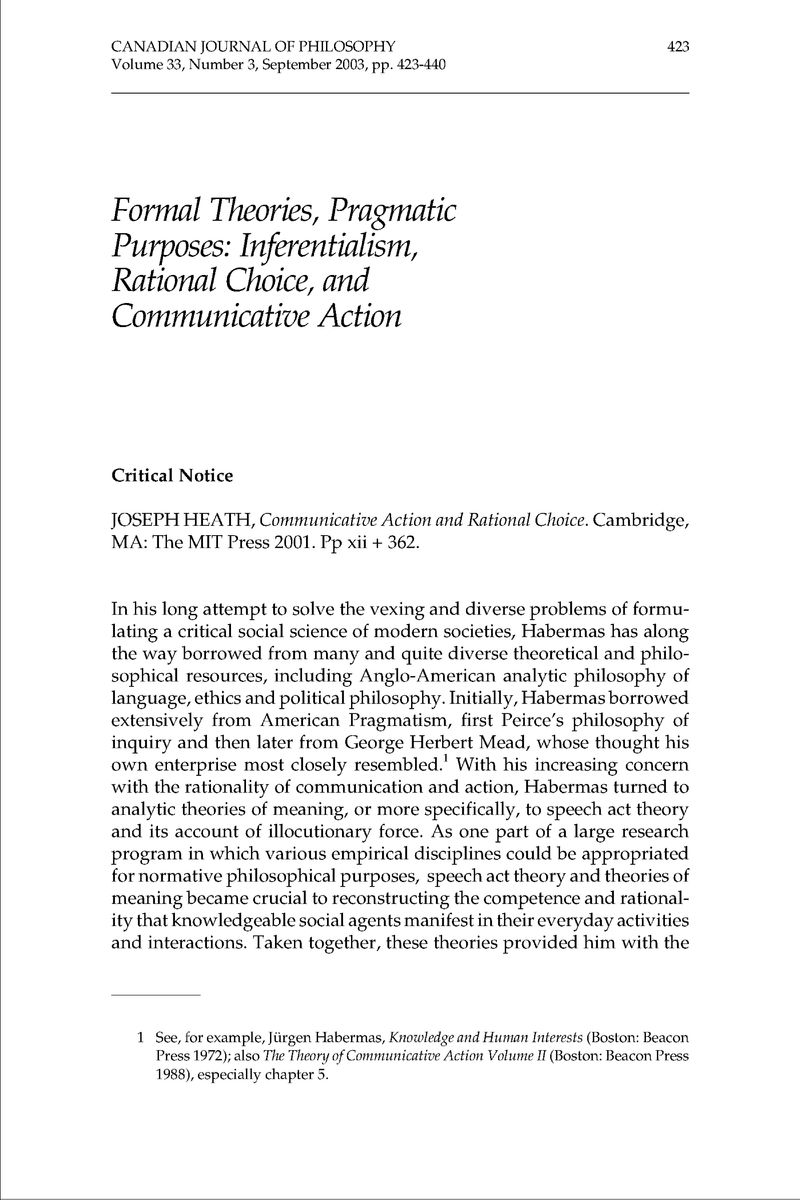Article contents
Formal Theories, Pragmatic Purposes: Inferentialism, Rational Choice, and Communicative Action
Published online by Cambridge University Press: 01 January 2020
Abstract

- Type
- Critical Notice
- Information
- Copyright
- Copyright © The Authors 2003
References
1 See, for example, Habermas, Jürgen Knowledge and Human Interests (Boston: Beacon Press 1972)Google Scholar; also The Theory of Communicative Action Volume II (Boston: Beacon Press 1988), especially chapter 5.
2 See Cooke, Mauve Language and Reason (Cambridge: The MIT Press 1998)Google Scholar.
3 For examples of this sort of analysis applied to a variety of institutions, see Knight, Jack and Sened, Itiad Explaining Institutions (Ann Arbor: University of Michigan Press 1999)Google Scholar.
4 This is the way that Johnson, James approaches the issue. See, among other essays, ‘Is Talk Really Cheap? Prompting a Conversation Between Critical Theory and Rational Choice,’ American Political Science Review 87 (1993) 74-86CrossRefGoogle Scholar.
5 See, for example, the following description of rationality defined in terms of know how: ‘Rationality has less to do with the possession of knowledge than with now speaking and acting subjects acquire and use knowledge. In linguistic utterance it is expressed explicitly; in goal directed action an ability, an implicit knowledge is expressed; this know how can in principle also be transformed into a knowing that.’ See Theory of Communicative Action, Volume I (Boston: Beacon Press 1984). The competence/performance distinction guides his understanding of universal or formal pragmatics.
6 Cited by Heath, 186; the quotation is from an early essay on the topic that Habermas does not wish to have translated because it presents a consensus theory of truth that he now rejects. See ‘Wahrheitstheorien,’ in Vorstudien und Ergänzungen zur Theorie des Kommunikativen Handelns (Frankfurt: Suhrkamp Verlag 1984), 130.
7 Habermas's views on the relation of truth and rightness have been unstable. The position that Heath critieizes is the view Habermas defended in the 1990s. My criticisms reflect the more pragmatic interpretation offered in Wahrheit und Rechtfertigung (Frankfurt: Suhrkamp Verlag 1999), in the essay ‘Wahrheit und Richtigkeit,’ 271-318. For the specifie passage, see Truth and Justification (Cambridge: The MIT Press forthcoming), 241.
8 See Habermas, ‘From Kant to Hegel: On Robert Brandom's Pragmatic Philosophy of Language,’ The European Journal of Philosophy 8 (2000) 322-335.CrossRefGoogle Scholar
9 See Brandom, Robert Making It Explicit (Cambridge: Harvard University Press 1994), 625Google Scholar.
10 Habermas, ‘From Kant to Hegel,’ 350Google Scholar
11 See the discussion of attribution in Brandom, Articulating Reasons (Cambridge: Harvard University Press 2000), 181Google Scholar.
12 ‘Where the specification of the content depends only on auxiliary premises that (according to the ascriber) the target of the ascription acknowledges being committed to, though the ascriber may not, it is put in the de dicto position…. Where the specification of the content depends on auxiliary premises that the ascriber endorses, but the target of the ascription may not, it is put in the de re position’ (182).
13 On these issues, see Heritage, John Garfinkel and Ethnomethodology (Oxford: Polity Press 1984)Google Scholar, especially chapters 1 and 2. Thomas McCarthy uses ethnomethology to find pragmatic equivalents for Habermas's transcendental idealizations. See Hoy, David and McCarthy, Thomas Critical Theory (London: Blackwell 1994)Google Scholar.
14 Theory of Communicative Action, Volume II, 125.
15 I owe the formulations in this paragraph to a discussion with Joseph Heath concerning the differences between our attempts to weaken Habermas's strong claims while reconstructing his viable theory.
- 1
- Cited by


